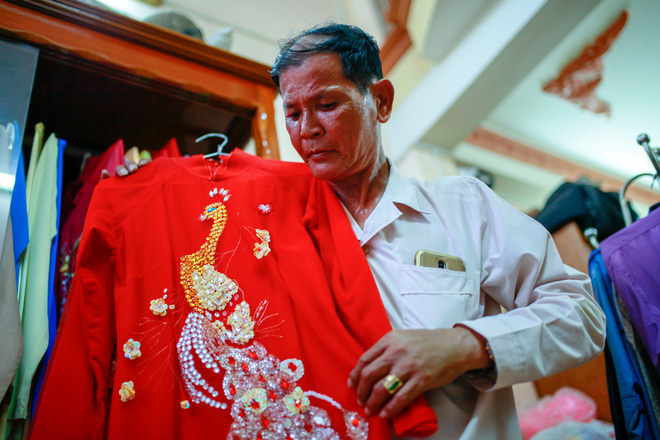Mua bong roi, a religion-based singing and dancing art form in southern Vietnam, was officially recognized as an intangible cultural heritage by UNESCO in 2017. Its gay performers weave religious rituals and acrobatic tricks into their elegant moves.
Mua bong roi dates back more than 300 years and is heavily associated with the worship of goddesses in temples and shrines around the south of Vietnam.
It features female figures using their vocal and body language to worship the goddesses, including Ba Chua Xu (the goddess of prosperity), Ba Hoa (the goddess of fire), or Ba Chua Ngoc (the goddess of pearls).
Mua bong roi manifests the sense of gratitude the Vietnamese people hold for the feminine gods, their ancestors and recently deceased family members.
The dance derived from the pajao performance of the Cham people living in Vietnam as a result of cultural contact.
One outstanding feature of the dance, though, is its practitioners.
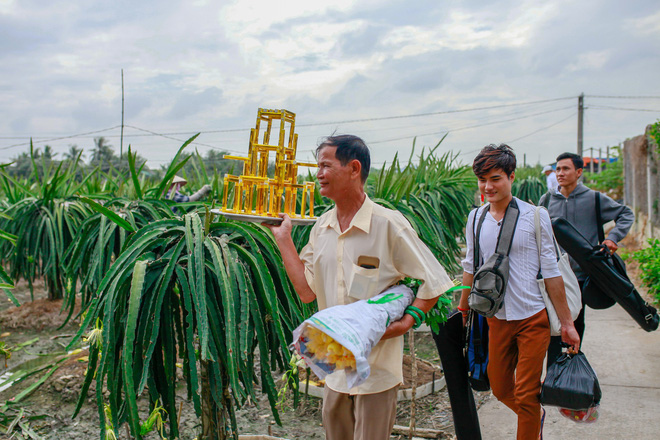 |
| Le Minh Hung and his students get ready to go to work. Photo: Tuoi Tre |
While pajao dancers had to be virgins or beautiful women, mua bong roi performers are generally elderly women or gay men.
An onlooker may see at a mua bong roi show somewhat an image of elegant ladies doing circus tricks.
One performance includes the dance part and the singing section.
Like an acrobat, a mua bong roi dancer can manipulate sets of knives, kitchenware, chairs, trays of offerings and even snakes.
To successfully make these moves, a dancer needs fine motor skills and balance, as well as utmost elegance in every single step.
This part of the show attracts the audience the most due to its sense of suspension upon every seemingly deadly trick.
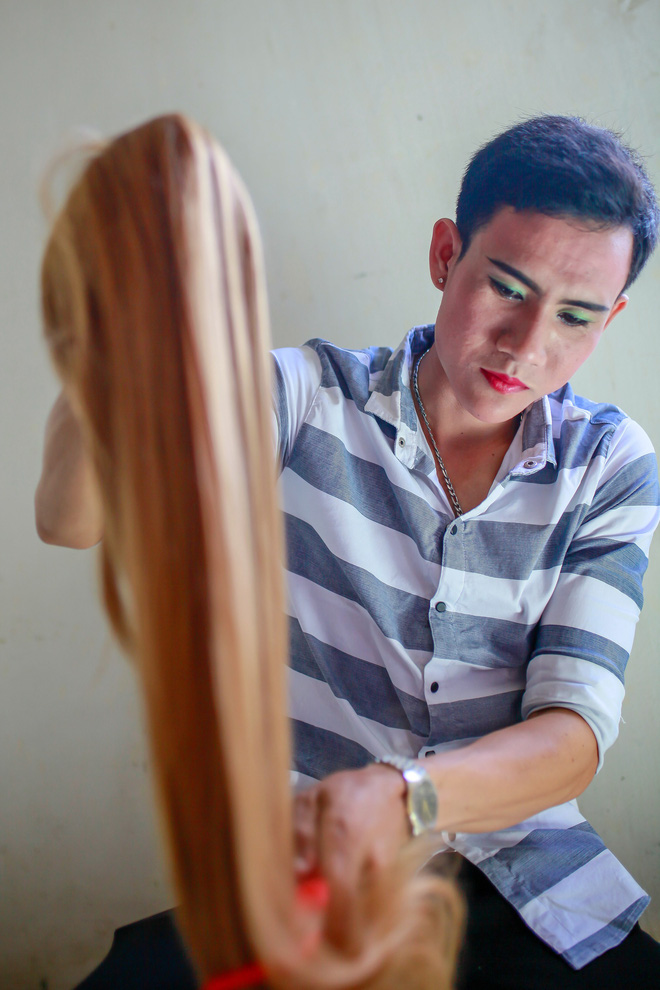 |
| Nguyen Tan Loi, 23, one of Hung’ students. Photo: Tuoi Tre |
The singing part is where performers give an ad-lib melodic vocal translation of their commissioner’s request, e.g. what they wish to tell their deceased member during a funeral.
Dressed in elaborate clothing with a small drum in their hands, mua bong roi artists sing to the female gods and pray for their blessing and protection.
A hard-core male mua bong roi artist
Le Minh Hung, 58, has been on the job of mua bong roi for the last 30 years.
Withstanding familial disapproval, hate and corporal punishment, he stood firmly on his track to becoming a recognized mua bong roi artist.
Based in Tan An City, Long An Province, roughly 30km from Ho Chi Minh City, Hung spends his free time helping his wife and daughter sell eggs for a living, and dedicates himself whole-heartedly to the art of mua bong roi during the remaining time.
His service is popular at temple festivals from around November to January of the lunar calendar, and also at funerals.
One popular sight in southern Vietnam is dancing performances on the occasion of someone’s death.
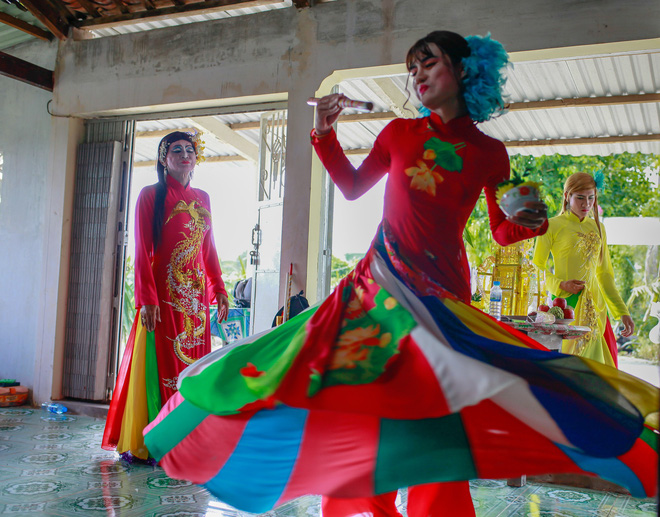 |
| Mua bong roi requires a man to put on female clothes and perform elegant moves. Photo: Tuoi Tre |
Hung’s business extends over the boundary of Long An to other provinces in the Mekong Delta as well as Ho Chi Minh City.
He recently received a pending title for outstanding artists for his commitment to maintaining mua bong roi for more than three decades.
“I fell in love in this art form long ago. My passion grew strong when I was 18, but my family kept saying no,” he said.
“They left me with a toddler to look after so that I wouldn’t have time to go, but I didn’t relent. I took the kid with me too.”
But his little nephew let the cat out of the bag, and Hung got a good beating.
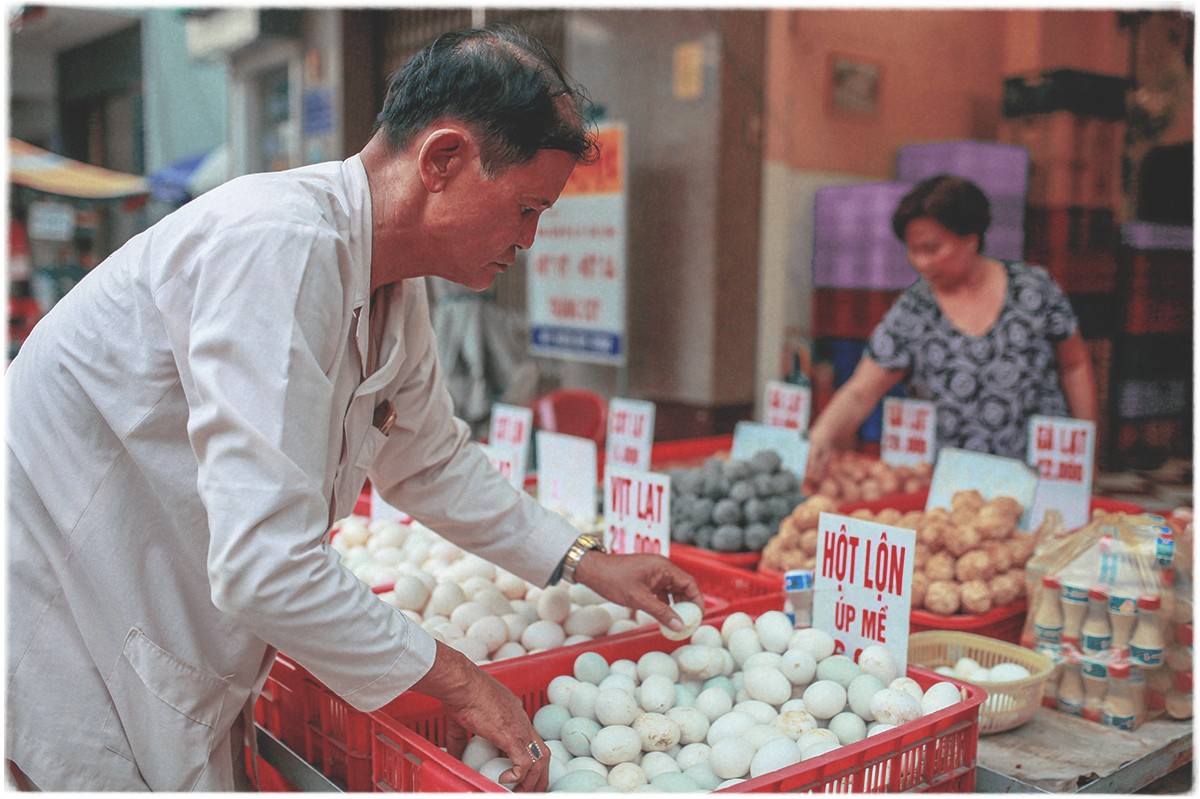 |
| Le Minh Hung helps his family sell eggs for a living in his spare time. Photo: Tuoi Tre |
“I passed out from their flogging, but I would never give up. Finally my mother stepped in. Then, all my brothers agreed to let me choose my own life path.”
Hung says he is fortunate to have a supportive wife and understanding daughter, for they too have experienced a hard time having a spouse and father so ‘gay.’
“My husband chose to do a job that people would call ‘co bong’ [a gay man dancing]. But I’m his wife. I love him,” Tran Thi Bay, his wife, said.
Passing down the flame
Over the years, he has trained quite a number of students, but many dropped out along the way.
The job can be a disgrace to one’s family, but it definitely is no easy profession.
Playing around with snakes and knives and learning to balance objects take years of risky practice.
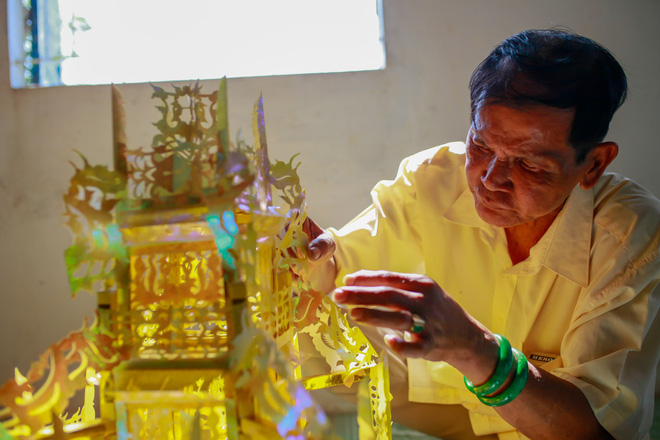 |
| Le Minh Hung takes care of his dance tool. Photo: Tuoi Tre |
When he was 27, Hung had a knife slip off his bamboo stick and landed right in his teeth while performing a knife trick.
But this only made him stronger.
One of his students, Nguyen Tan Loi, 23, has a similar attitude.
“It was really challenging at first. Master [Le Minh Hung] only allowed me to practice with a soft branch in my first times,” Loi said.
“Then I got to practice with two knives, then four, then six. I had to get them all balanced on the tip of a bamboo stick. It is dangerous, but I’m determined to pursue this career.”
Tran Van Thinh, 26, is another student who had to overcome social contempt to do a job that requires a man to put on loads of make-up.
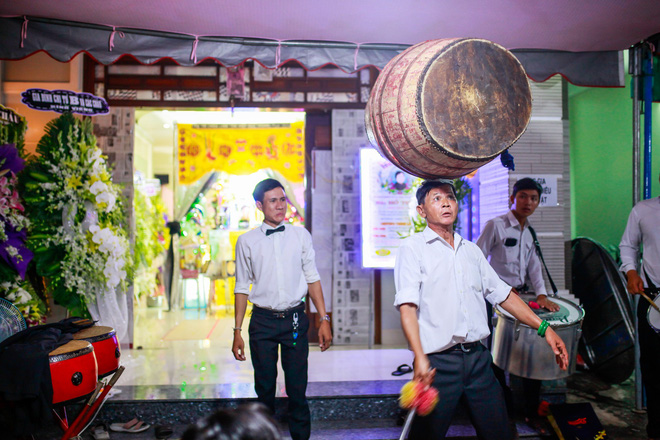 |
| Le Minh Hung at work. Photo: Tuoi Tre |
Like us on Facebook or follow us on Twitter to get the latest news about Vietnam!



